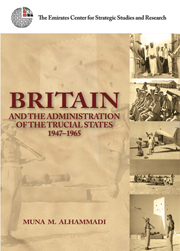Book contents
- Frontmatter
- Contents
- Abbreviations and Acronyms
- Preface
- Introduction
- 1 British Administration in the Trucial States before 1965
- 2 The Trucial Oman Levies and Scouts, 1951–1965
- 3 The Trucial States Council, 1952–1965
- 4 The British Role in the Development of the Trucial States before 1965
- Conclusion
- Notes
- Bibliography
- About the Author
- Index
3 - The Trucial States Council, 1952–1965
Published online by Cambridge University Press: 05 September 2014
- Frontmatter
- Contents
- Abbreviations and Acronyms
- Preface
- Introduction
- 1 British Administration in the Trucial States before 1965
- 2 The Trucial Oman Levies and Scouts, 1951–1965
- 3 The Trucial States Council, 1952–1965
- 4 The British Role in the Development of the Trucial States before 1965
- Conclusion
- Notes
- Bibliography
- About the Author
- Index
Summary
British politicians, spurred on by the prospect of finding commercial quantities of oil in the emirates, began to seek a more robust rapprochement with the Sheikhs of the region. Shortly before the end of his service in 1939, Trenchard C. Fowle, the Political Resident in the Gulf, proposed that the British government revise its traditional policy of non-intervention in the domestic affairs of the region, allowing Britain to provide guidance to the Sheikhs on how best to employ their new wealth, presenting development plans, and drawing upon the expertise of relevant specialists who would provide consultation and guidance only; the arrangement would not work if the rulers were coerced.
Fowle proposed a new policy of indirect influence, relying on dialogue instead of the more forceful techniques employed in the past. Although he conceded that this policy could be costly in financial terms, and certainly required greater patience, Fowle believed that it would be of great benefit to Britain in terms of its activities in the region. This would not mean that British prestige would be in any way undermined, however; in the event that an article of any signed agreement were breached, strict and decisive arrangements could be reinstated—indeed, the mere threat of such a course of action would suffice as a suitable deterrant in most cases.
One of the motivations for the strategy advanced by Fowle was the fact that several Arab countries had accused Britain of shirking its responsibilities towards the Gulf sheikhdoms. If this impression were to spread to the Gulf, it could have negative consequences for Britain.
- Type
- Chapter
- Information
- Publisher: Emirates Center for Strategic Studies and ResearchPrint publication year: 2013



